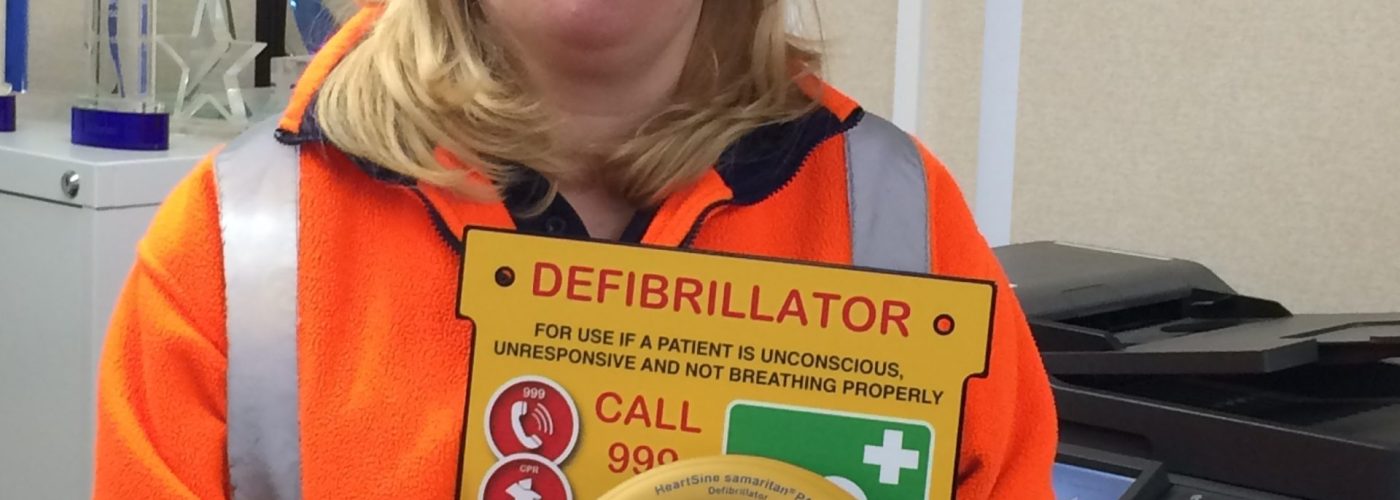Mobile Mini, one of the leading worldwide providers of portable accommodation and secure storage containers, has recently installed defibrillators at every one of its sites across the UK. This includes all branches, support centres and the company headquarters located in Stockton-on-Tees.
An Automated External Defibrillator (AED) is a portable device that checks the heart rhythm of someone suffering a Sudden Cardiac Arrest (SCA) who is unconscious, unresponsive or not breathing properly. If required, it can send electric shocks to the heart to try to restore a normal rhythm and is used in conjunction with CPR to treat cardiac arrest. Mobile Mini employs approximately 370 members of staff in a variety of roles all over the UK. The business has built an incredible reputation for the quality of its solutions and products but never forgets that its people are the most valuable asset.
The defibrillators that are now installed on the Mobile Mini sites are the Heartsine 360P models and are designed to provide fully automatic shocks as required. This model utilises a defibrillation method of biphasic waveform with impendence compensating and escalating energy. The pads are contained within a removable carry case and there is no need to plug into an external power supply. The equipment has mostly been installed in supervised areas and is kept on a secure hanger at an accessible height, so they are reachable by the disabled.
Instructional steps are needed for an AED to be used effectively, but this is made easy with full-automation capability. Operation involves just two steps, turning the device on and sticking pads to the patient’s chest. The advanced technology within the AED monitors heart rhythm and then decides if to shock, when to shock and at what power to shock at. The equipment is capable of instructing users when it is required to deliver a shock, indicated by a green readiness light, and also talks through the entire process as it undertakes each step. Staff training on using this equipment effectively is also set to be conducted soon, removing any confusion or stressful decision making in a potential emergency.
The British Heart Foundation advises, that for every minute it takes a defibrillator to reach someone and deliver a shock, their chances of survival reduce by up to 10%. The chances of surviving a cardiac arrest jumps from just 6% to 74% if a defibrillator is deployed within 3 minutes.
Chris Watcham, Health and Safety Director at Mobile Mini UK says “We are very proud to say that life-saving equipment is now on-hand for every staff member at our branches all over the UK. Whilst purchasing a large quantity of defibrillators requires a significant investment, we understand how important this is. The well-being and safety of our employees, clients and customers remains our number one priority and we have begun exploring the procurement requirements for some clients who have expressed interest in following our lead.”
The defibrillators have been provided to Mobile Mini by AADEFIB, a Lincolnshire based operation that has provided over 1000 of these life-saving machines to businesses and communities throughout the UK. Andrew Deptford who owns AADEFIB, says, “Emergencies can happen when least expected, so every company needs to take preventative steps seriously. These defibrillators are rugged, reliable and I consider them to be amongst the best value and most user-friendly machines available. They are built by the company that supplies around 70% of the UK’s Ambulance and First Responder crews. It is fantastic that Mobile Mini has rolled these out across all of their UK locations as this shows a genuine desire to provide the safest workplace imaginable. It has been a pleasure dealing with the professionals at Mobile Mini.” In addition to ensuring the best possible environment is provided for its employees, Mobile Mini applies the same mindset towards supporting its suppliers, ensuring payments are made quickly and fairly, even throughout the recent unprecedented health crisis. The business has gone above and beyond during the coronavirus pandemic to ensure all suppliers are paid faster than the industry average, with the majority receiving funds within 17 days over the last 12 months.





